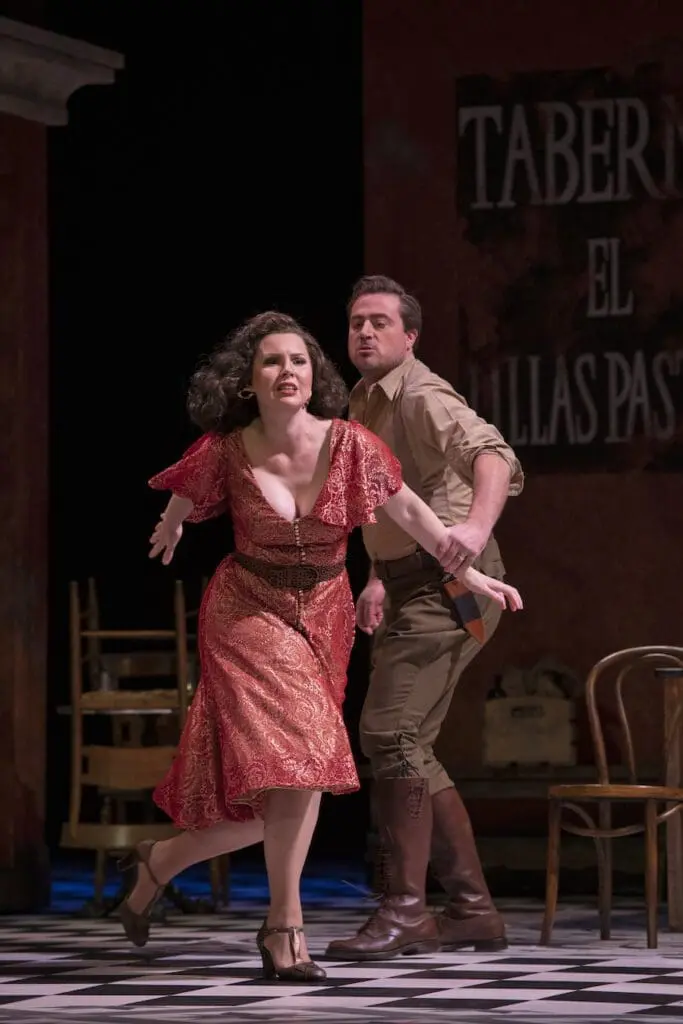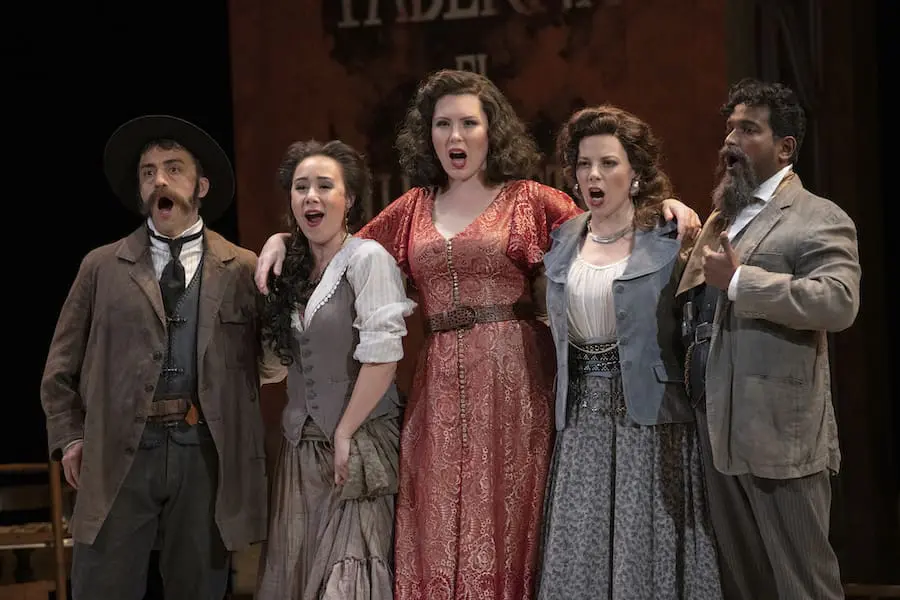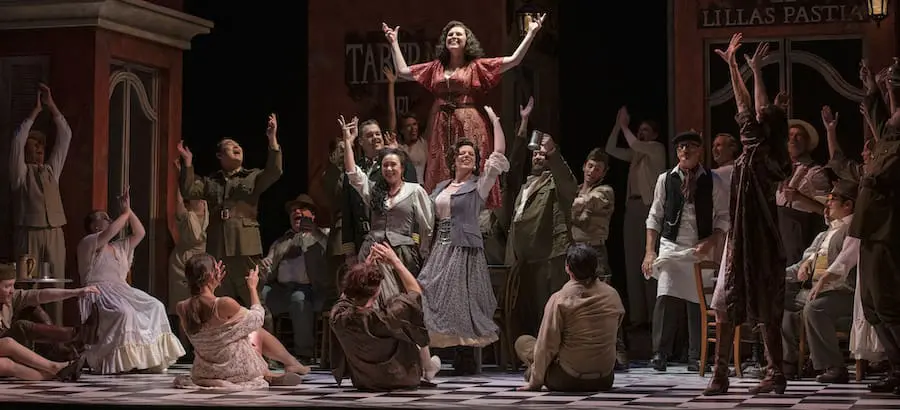Pacific Opera Victoria’s Carmen finally opened on October 12, 2022, after multiple COVID-caused postponements. It was well worth the wait. First mention has to go to the chorus, which did such an extraordinary job they came close to eclipsing the rest of the production. Under the direction of Guiseppe Petraroia, the 30-member group of young vocal students, sprinkled with more experienced singers, raised the roof of the Royal Theatre when called upon, but also played their changing roles as soldiers, factory girls, townspeople, women of questionable moral character and bandits with both skill and commitment. Their sound was cohesive and powerful, but also sophisticated and refined. Astonishing for a volunteer chorus.

Carolyn Sproule as Carmen and Adam Luther as Don José Ⓒ David Cooper
Fortunately, Canadian mezzo Carolyn Sproule, as Carmen, more than held her own against the power of massed voices. She was a stand-out, not just for her singing—which was rich, creamy and expressive—but her acting too. This is the first time I have ever felt that Carmen was a real, and very dangerous, woman. Far from the simple, sexy flirt she is so often depicted as, Sproule’s Carmen had a psychopath’s smile on her face as she gazed at Manuelita, the woman she had slashed with a knife in an argument, while at the same time she was totally convincing as a woman for whom men would fall in droves, even having seen that terrifying smile. With that expressive face and powerhouse voice, Sproule is clearly a singer with a huge career ahead of her.
Always overshadowed by the force of nature that is Carmen, playing simple country girl Micaëla would be a thankless task were it not for a couple of exquisite tunes—which soprano Lauren Margison handled beautifully. The Act III aria “Je dis que rien ne m’épouvante,” where Micaëla tells herself not to be afraid as she approaches the smugglers camp where her fiancée Don José now lives with Carmen, was a clear audience favourite. Margison’s sweet, lyrical voice effortlessly captured both Micaëla’s fear and her courage as she prepared to confront her rival. But alas, no matter how pure her voice or virtuous her character, she never stood a chance against the woman with the gleaming eyes and killer smile.
2022 Rubies Awards Gala
Monday, November 7, 2022 6PM
An Evening Celebrating Canadian Opera Artists
FOUR SEASONS CENTRE FOR THE PERFORMING ARTS
TICKETS & INFORMATION
As the love object of these two diametrically opposite women, tenor Adam Luther acquitted himself well. His voice was strong, attractive and secure and he had an easy stage presence, but needed to up the wattage just a little to wrest our attention to his side of the story, which is just as dramatic as Carmen’s. Don José’s fall from respectful son and noble soldier to smuggler and finally murderer is psychologically fascinating, yet it felt underplayed here. This could, however, have been the responsibility of director François Racine, rather than Luther himself, since baritone Jorell Williams, as Escamillo, also did not capitalize fully on the opportunities to swagger in his role. Like Luther, Williams sang very well and did full justice to the Toreador Song, but he needed to be bigger, to stand still less and rule the stage more.

Geoffrey Schellenberg as Dancaïro, Andrea Núñez as Frasquita, Carolyn Sproule as Carmen, Marjorie Maltais as Mercédès, and Asitha Tennekoon as Remendado Ⓒ David Cooper
These, however, are quibbles in a production with so much going for it, including exceptional performances in smaller roles, starting with Geoffroy Salvas as Moralès at the very top of the opera. A voice of that quality in a minor part signalled the depth of talent throughout the rest of the cast, which included Andrea Núñes and Marjorie Maltais as Carmen’s two racy friends, Frasquita and Mercédès; Neil Craighead as Don José’s Lieutenant, Zuniga; and Geoffrey Schellenberg and Asitha Tennekoon as the smugglers, Dancaïro and Remendado.
The visuals too, were, for the most part, extremely satisfying. The decision to move the opera from its original setting in the 1830s, when Spain was roiled by various wars and rebellions, to the Spanish Civil War of the 1930s, was made by the original director signed by POV for this production. Perhaps that director planned to make some use of the change to a very specific war that the Holocaust Dictionary calls a “breeding ground for mass atrocities” to add to the atmosphere, but it turned out to be neither here nor there under Racine.
Despite that missed opportunity, however, costume designer Sylvain Genois made the most of (usually) somewhat dreary 1930s fashions to make Sproule’s Carmen pop in beautifully tailored red dresses, while the set by Olivier Landreville was a marvel of utility, its moveable parts easily shifting to create a town square, city taverna, woodland hideout and the entrance to Savilla’s bullfight arena. And the decision to let the audience see how that set was moved—using people, not technology, in perfectly timed and choreographed symmetry—between Act I and Act II was a spine-tingling moment of stage magic that deservedly received its own round of applause.
Jacques Lemay, the person presumably behind that set choreography and certainly responsible for the stylish, swirling entrances and exits of the large chorus and the simple yet evocative dancing by the gypsy women in Act II, added great vitality and visual heft to this Carmen—matching the aural heft provided by the Victoria Symphony in the pit. Under the baton of Timothy Vernon, the orchestra brought clearly articulated sound, crisp rhythms and a lovely Spanish verve, making Carmen’s familiar tunes feel fresh and new.
Opera Canada depends on the generous contributions of its supporters to bring readers outstanding, in-depth coverage of opera in Canada and beyond. Please consider subscribing or donating today.
BIZET CARMEN
Pacific Opera Victoria
OCT 12 – 18, 2022
CAST AND CREATIVE TEAMS
Carmen Carolyn Sproule
Don José Adam Luther
Escamillo Jorell Williams
Micaëla Lauren Margison
Zuniga Neil Craighead
Dancaïro Geoffrey Schellenberg
Remendado Asitha Tennekoon
Frasquita Andrea Núñez
Mercédès Marjorie Maltais
Moralès Geoffroy Salvas
Lillas Pastia Jacques Lemay
The Victoria Symphony
Chorus
Pacific Opera Chorus and Supernumeraries
Children’s Choir
Victoria Children’s Choir















